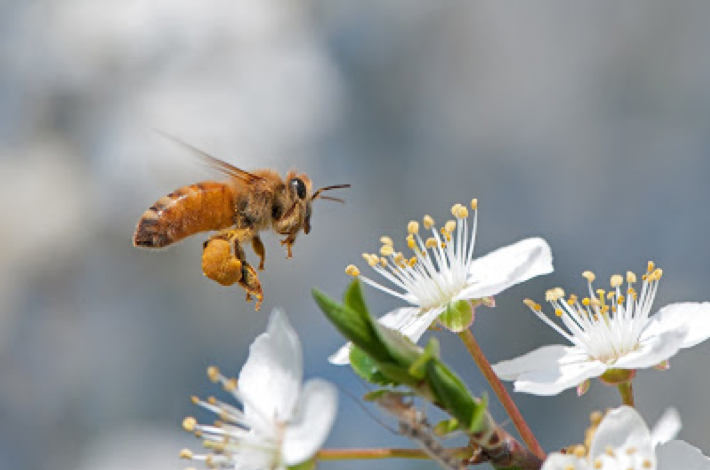
"Forager bees," who gather pollen away from the colony, are believed more vulnerable to pesticides. Photo: Serena Magagnoli.
It's brand name is "Sivanto" (flupyradifurone). It's designed to kill a wide range of insects which eat food crops like soybeans. Bayer plans to register it in many jurisdictions around the world.
After conducting various field studies, Bayer has concluded, "Sivanto
displays a very promising safety profile." The company concedes, it works in ways similar to the neonicotinoids (a group of insecticides which has become notorious for its likely role in pollinator decline). Nevertheless, the company believes, Sivanto “can be considered safe to most beneficial insects, specifically pollinators."

A ground sprayer applies pesticides in Manitoba. A PinP photo.
|
But a team of scientists at the University of California, San Diego, is not so sure. In recent research, the team gave a range of Sivanto doses to the bees, including those they encounter in the field. By itself, the chemical did not appear to be harmful. But, when combined with the fungicide propiconazole (brand name "Banner Maxx"), widely-used by farmers, the harm was "greatly amplified." The bees either sickened or died, apparently because the fungicide weakened their ability to shake off the toxicity.
It's not uncommon for pollinators to be subjected to a dizzying array of pesticides all at once, while foraging in the fields. Through a process called "synergism," they can suffer harm they would not, if exposed to just a single one.
The spokesperson for the team, Dr. Simone Tosi, tells PinP, she does not believe that regulations in the US require manufacturers to test for synergistic effects when they apply to have their products approved. But neither does she think that such regulations prohibit such testing.
In a news release, her team says, "We believe this work is a step toward a better understanding of the risks that pesticides could pose to bees and the environment. Our results highlight the importance of assessing the effects pesticides have on the behaviour of animals, and demonstrate that synergism, seasonality and bee age are key factors that subtly change pesticide toxicity." They call for further studies to better assess the risks to pollinators.
But at least some of those other studies have already been done. And they come up with similarly negative conclusions. A team from three German universities has found that flupyradifurone binds to the brain receptors of honeybees, harming their motor skills.
Meanwhile, Bayer's marketing plans for its new product are nothing short of ambitious. It promises to "develop, register and sell" Sivanto in many places across the world, including the US, Europe, Asia, Ghana and Brazil. While Canada isn't mentioned, specifically, there seems little doubt it will end up here, too.
The German-based multinational says it wants to see its product "in all major climatic zones allowing agriculture."
|
Last April, I e-mailed the federal Minister of Agriculture, Marie-Claude Bibeau, Canada's Pest Management Regulatory Agency, Manitoba's Minister of Health, Kelvin Goertzen and Manitoba’s Deputy Minister of Agriculture to ask them about this new research and whether Sivanto will be registered in Canada. Apart from automated responses, I have received no reply.
By: Larry Powell

Larry is an eco-journalist living in Shoal Lake, Manitoba. He’s a member of the SWCC and the American Association for the Advancement of Science. He’s authorized to receive embargoed material through the Science Media Centre of Canada, the Royal Society and the World Health Organization. He’s prepared to supply interested publications with important stories about the latest findings in the field of the Earth Sciences. He publishes www.PlanetInPeril.ca (PinP), “where science gets respect.”
